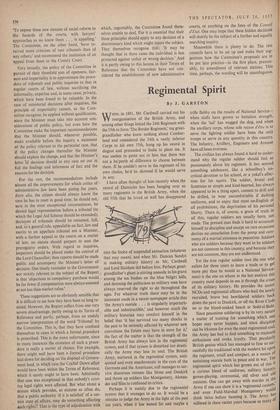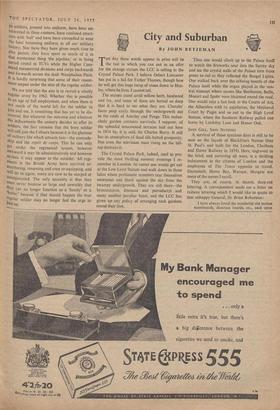Regimental Spirit
By J. GARSTON WHEN, in 1881, Mr. Cardwell carried out his reorganisation of the British Army, and among other things linked the 34th Regiment with the 55th to form 'The Border Regiment,' my great- grandfather who knew nothing about Cumber- land and considered the 34th a vastly inferior Corps to his own 55th, hung up his sword in disgust and proceeded to India to plant tea. It was useless to point out to him that there was not a ha'porth of difference to choose between them. If he couldn't serve in the regiment of his own choice, he'd be damned if he would serve in any.
I have often thought of him recently when the sword of Damocles has been hanging over so many regiments in the British Army, when the old 55th that he loved so well has disappeared into the limbo of suspended animation (whatever that may mean), and when Mr. Duncan Sandys is making military history as Mr. Cardwell and Lord Haldane did before him. Perhaps great- grandfather's ghost is stirring uneasily in his grave among the tea bushes on the blue Nilgiri hills, and damning the politicians as military men have always reserved the right to do throughout the ages. For whatever truth there may be in the statement made in a recent newspaper article that 'the Army's morale . . . is singularly imperturb- able and indestructible,' and however much the military historian may comfort himself in the belief that 'it has survived too many shocks in the past to be seriously affected by whatever new convulsion the future may have in store for it,' the fact of the matter is that the strength of the British Army has always lain in the regimental system, and if that system is disturbed too drasti- cally the Army may lose its soul. The British Army, nurtured in the regimental system, anti- quated and even anachronistic in the eyes of the Germans and the Americans, still manages to sur- vive disastrous retreats like Mons and Dunkirk and throw up soldiers like Montgomery, Alexan- der and Slim to confound its critics.
Perhaps it is mainly due to the regimental system that it manages to do so. It would be a mistake to judge the Army in the light of the past ten years, when it has waxed fat and maybe a trifle flabby on the results of National Service— when staffs have grown to battalion strength, when the 'tail' has wagged the dog, and when the ancillary corps, whose sole raison d'être is to serve the fighting soldier have been the only troops to serve in any quantity in this country. The Infantry, Artillery, Engineers and Armour have all been overseas.
The civilian has always found it hard to under- stand why the regular soldier should feel so passionately about his regiment. It has seemed something adolescent, like a schoolboy's un- critical devotion to his school, or a yokel's affec- tion for his squire. The soldier, brutal and licentious or simple and kind-hearted, has always appeared to be a thing apart, content to drill and be drilled, to wear uncomfortable if dashing uniforms, and to enjoy that most un-English of all prohibitions, the deprivation of his personal liberty. There is, of course, a grain of truth in all this; regular soldiers are usually born, not made. The pressed man finds it hard to accustom himself to discipline and except on rare occasions derives no consolation from the pomp and cere- mony of a martial existence in peacetime. Soldiers who are soldiers because they want to be soldiers are not common in this country, and because they are not common, they are not understood.
Yet the true regular soldier (not the one who enlists for three years to learn a trade or to get more pay than he would as a National Service- man) is the one on whom in the last analysis this country most depends to see it through the crises of its military history. He provides the senior NCOs and regimental officers who lead the newlY recruited, brave but bewildered soldiers back down the pave to Dunkirk, or off the River Clyde on to the blood-soaked beach at Sedd-el-Bahr.
Since peacetime soldiering is by its very nature a matter of training for something which one hopes may never happen, and since discipline can be irksome for even the most regimented soul, the Army has had to find something to maintain enthusiasm and evoke loyalty. That peculiarlY British genius which has managed to fuse so sue- cessfully the traditional with the modern hit upon the regiment, small and compact, as a means of sustaining morale both in peace and in war. The regimental spirit which has grown out of this is a curious blend of uniforms, military history, games-playing, ceremonial, old silver and old customs. One can get away with murder in the Army if one can show it is a 'regimental custorn, and even Field-Marshal Montgomery would think twice before banning it. The Army has, suffered in these recent years because so many 01 its soldiers, pressed into uniform, have been un- interested in these customs, have confused smart- ness with 'bull' and have been compelled to wear the least becoming uniform in all our military history. Nor have they been given much time to Play games; they have spent so much of it in that mysterious thing 'the pipeline,' or in being carted round in TCVs while the Higher Com- Mand manceuvred divisions and corps backwards and forwards across the drab Westphalian Plain. It is hardly surprising that some of their resent- client seeped under the skin of the regular soldier.
We are told that the aim is to recruit a wholly regular army by 1962. Whether this is possible m an age of full employment, and when there is not much of the world left for the soldier to loin and see, is something that has yet to be dis- covered. But whatever the outcome and whatever the inducements the country decides to offer its Soldiers, the fact remains that the born soldier Will still join the Colours because it is the glamour of military life which attracts him—the comrade- ship and the esprit de corps. This he can only get under the regimental system, however awkward it may be administratively and however archaic it may appear to the outsider. All regi- ments in the British Army have survived re- numbering, renaming and even re-equipping, and will do so again; many are now to be merged or amalgamated. The only necessity is that they must never become so large and unwieldy that they can no longer function as a 'family' or a home,' because if that should happen the true r.egolar soldier may no longer feel the urge to loin up.































 Previous page
Previous page